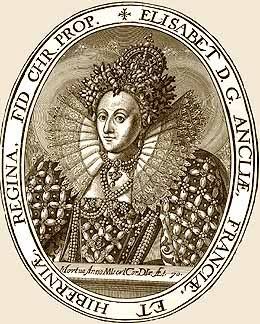The Elizabethan Era is the period associated with the reign of Queen Elizabeth I (1558–1603) and is often considered to be a golden age in English history. It was the height of the English Renaissance, and saw the flowering of English literature and poetry. This was also the time during which Elizabethan theatre flourished and William Shakespeare, among others, composed plays that broke away from

When it is sufficiently roasted and brown, then dredge it. Draw it from the fire, take vinegar and butter, and put it on a chafing dish and coals, and boil it with White-bread crumbs till it be thick.
Then put to it a good store of sugar and cinnamon, and putting it in a clean dish, lay the cow’s udder therein, and trim the sides of the dish with sugar, and so serve it up.
Sweet Cubes of Jellied Milk
Original recipe: (translation is below)
A white leach: Take a quart of newe milke, and three ounces weight of Isinglasse, half a pounde of beaten suger, and stirre them together, and let it boile half a quarter of an hower till it be thicke, stirring it with three sponfull of Rosewater, then put it into a platter and let it coole, and cut it in squares. Lay it faire in dishes, and lay golde upon it.
Modern version:
1 pint of milk
5 teaspoons of gelatin
8 tablespoons of sugar
1.5 tablespoons of rosewater
Put 4 tablespoons of the milk in a cup and sprinkle the gelatine on top of it. Let it sit for 5 minutes.
Then stand the cup in hot water and stir the gelatin into it until it is completely dissolved.
Warm the remaining milk. Stir in the gelatin-milk and the sugar.
Simmer, stirring continuously, for 5 minutes.
Remove from the heat and stir in the rosewater.
Rinse a 7-inch square (or so) shallow baking dish with cold water and then pour the milk mixture into it. Allow it to set firmly in a cool place before cutting into squares with a sharp knife. The squares may then be either arranged in a regular pattern or stacked as a pyramid on a flat plate, ready for the table. Cut and lay pieces of gold leaf on chosen squares.
Or instead of squares, cut and arrange the pieces into a fabulous artistic arrangement and decorate with the gold leaf.Roasted Calf Head
Make a little hole in the head and pluck out all the brains, and lay the head to soak. [Don't throw away the bone from the hole because you'll need it later.]
Then to make a pudding in it, take White bread and lay it to soak in milk. Strain it thick, then take four yolks of eggs, cloves, mace, pepper, saffron, corrans, dates, and a good quantity of butter. Mix with the Brains to make a good Pudding, and fill the head full.
Then take the bone and stop the hole. When it is almost cooked enough, cast crumbs of bread on it.
Then clean it and make sauce to it with cinnamon, sugar, ginger, and vinegar, and boil them all together. Then you may serve it forth.
~~Unknown~~
No comments:
Post a Comment